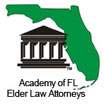Florida Elder Abuse
What is Elder Abuse?
Elder abuse is any willful act or threatened act by a caregiver that causes, or is likely to cause, significant impairment to a vulnerable adult’s physical, mental, or emotional health. It includes both acts and omissions. Elder abuse includes financial exploitation of a vulnerable adult’s funds, assets, or property with the intent to temporarily or permanently deprive that adult of its use. It may also take the form of deception by misrepresentation or concealment of a material fact relating to services rendered, the disposition of property, or the use of property that is intended to benefit a vulnerable adult. Intimidation by word or act to a vulnerable adult that the person will be deprived of food, nutrition, clothing, shelter, supervision, medicine, medical treatment, money or financial support is elder abuse. It may also take the form of neglect by the failure or omission on the part of the caregiver to provide the care, supervision, and services necessary to maintain the physical and mental health of the vulnerable adult, including food, clothing, medicine, shelter, supervision, and medical services.
Remedies. Florida statutes provide several solutions when there has been abuse, which include Protective Services, civil actions for recovering assets, and criminal sanctions by the State.
Adult Protective Services Act
Fla. Stat. 413.101 The Legislature recognizes that there are many persons in this state who, because of age or disability, are in need of protective services. Such services should allow such an individual the same rights as other citizens and, at the same time, protect the individual from abuse, neglect, and exploitation. It is the intent of the Legislature to provide for the detection and correction of abuse, neglect, and exploitation through social services and criminal investigations and to establish a program of protective services for all disabled adults or elderly persons in need of them. It is intended that the mandatory reporting of such cases will cause the protective services of the state to be brought to bear in an effort to prevent further abuse, neglect, and exploitation of disabled adults or elderly persons. In taking this action, the Legislature intends to place the fewest possible restrictions on personal liberty and the exercise of constitutional rights, consistent with due process and protection from abuse, neglect, and exploitation. Further, the Legislature intends to encourage the constructive involvement of families in the care and protection of disabled adults or elderly persons.
Offenses Against Vulnerable Persons-criminal penalties. Fla. Stat. 825.101 "Definitions" & 825.103 "Exploitation of an elderly person or disabled adult; penalties" . This part of the Florida statutes defines exploitation, neglect, abuse and sexually inappropriate conduct and provides criminal penalties.
Fla. Stat. 825.103 clearly delineates what constitutes a crime and provides the penalties for exploitation of an elderly person or disabled adult. Breach of a fiduciary duty by a guardian, trustee, or agent under a power of attorney occurs when that individual engages in an unauthorized appropriation of property, abuses their power, intentionally mismanages assets, fraudulently obtains their appointment, or acts contrary to a principal’s best interest. This includes misappropriating, misusing, or transferring without authorization money belonging to an elderly or disabled person from an account in which that individual placed funds, owned the funds, or was the sole contributor of funds, including joint accounts established essentially for convenience. It is also a crime for a caregiver or any person who stands in a position of trust and confidence to intentionally or negligently fail to effectively use an elderly or disabled person’s income and assets for the necessities they require for their support and maintenance. Transfers of property valued in excess of $10,000.00, whether in single or multiple transactions, by a person 65 years or older to a nonrelative whom the elderly person knew for less than 2 years, where he or she did not receive equivalent financial value in goods or services, creates a permissive presumption that the transfer was the result of exploitation. It is a third degree felony where the funds, assets or property involved is valued at less than $10,000.00; a second degree felony if more than $10,000.00 but less than $50,000.00; and a first degree felony if valued at more than $50,000.00.
Fla. Stat. 825.1035 created a cause of action for an injunction for protection against exploitation of a vulnerable adult who is in eminent danger of being exploited. A sworn petition may be filed regardless of whether any other cause of action is currently pending. It may be filed by the vulnerable adult, his or her guardian, or a person or organization acting with their consent. If a guardianship action is pending, it is filed in that case; otherwise, in the circuit court.
Civil Actions
Fla. Stat. 415.1111
A vulnerable adult who has been abused, neglected, or exploited may also bring a civil action against the perpetrator for actual and punitive damages, and may be entitled to attorney's fees. This is in addition to criminal and administrative remedies that are available to the vulnerable adult.
Mandatory Reporting
Fla. Stat. 415.1034 requires physicians, nurses, paramedics, hospital personnel, health and mental health professionals, spiritual healers, nursing home, assisted living and adult day care staff, social workers, adult family-care home staff, state, county, or municipal criminal justice employees, law enforcement officers, employees of the Department of Business and Professional Regulation, Florida advocacy or long-term care ombudsman council members, as well as bank, savings and loan, or credit union officers, trustees and employees who know, or have reasonable cause to suspect, that a vulnerable adult has been or is being abused, neglected, or exploited to immediately report such knowledge or suspicion to the central abuse hotline.
How Do You Report Elder Abuse?
Elder abuse can be reported to the Florida Department of Children and Families (DCF), either by calling their hotline at 1(800) -96ABUSE, or by filing a report on-line at their website www.dcf.state.fl.us/programs/abuse/report.shtml.
Immunity
Fla. Stat. 415.1036 states that any person making a report of elder abuse, or participating in a judicial proceeding resulting therefrom is presumed to be acting in good faith, and is immune from civil and criminal liability, unless lack of good faith is shown by clear and convincing evidence. Any person making such a report has a cause of action for compensatory and punitive damages against anyone who causes detrimental changes to the reporting party’s residency or employment.










